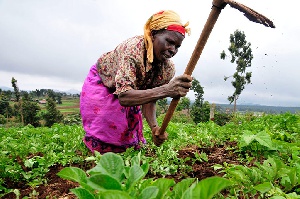Mr Vincent Affram, Assistant Northern Regional Agriculture Officer at the Plant Protection and Regulatory Services Division, has observed that one of the major challenges impeding farmers quest to increased yield in the region was high cost of inputs.
He said through various farming interventions by the Ministry of Agriculture and other development organizations, most farmers were up to date with new farming technologies, innovation and skills, but did not have money to buy the right inputs.
Mr Affram said this at Diamond FM, a Tamale-based radio station Advocacy Project, forum funded by STAR-Ghana in Tamale at the weekend.
The forum, which was attended by representatives of the Ministry of Agriculture, SEND-Ghana and the Department of Women, was on the theme: Tackling bottlenecks to the development of rural agriculture in the Northern Region; improving rural farmers access to Agricultural inputs supplies.
Mr Affram called for a further subsidy on agro inputs to ensure that farmers were able to buy certified seeds to increase yield.
A careful observation made over the years has shown that most farmers prefer to use seeds from their produce instead of acquiring the certified seeds for cultivation because they dont have money to buy the right seeds, he said.
He said the agric directorate had in stock about 157 metric tons of maize, 48 metric tons of soya beans and three tons of rice certified seeds, which farmers were not buying.
Mr Affram complained about the refusal of some financial institutions to grant farmers loans saying, Banks that grant loans to farmers do that at the same interest rates given to traders. This is not fair.
He said the directorate in collaboration with the security agencies had set up effective monitoring system to prevent the smuggling of fertilizers to other neighboring countries.
Mr Nelson Adanuti Nyadror, Project Manager said although women smallholder farmers were more productive, they faced many challenges, key among, which were inaccessibility to tractor service and agro inputs.
He explained that the Diamond FM Advocacy project was sought to increase access to agriculture inputs to farmers especially women and people with disabilities as well as farmers in the hard to reach communities.
We have started radio discussions and features on the challenges of farmers and their families to draw the attention of policy makers on the need to reshape certain policies to transform them into a sustainable action to better the lives of small holder farmers, he said.
Business News of Monday, 24 March 2014
Source: GNA

















